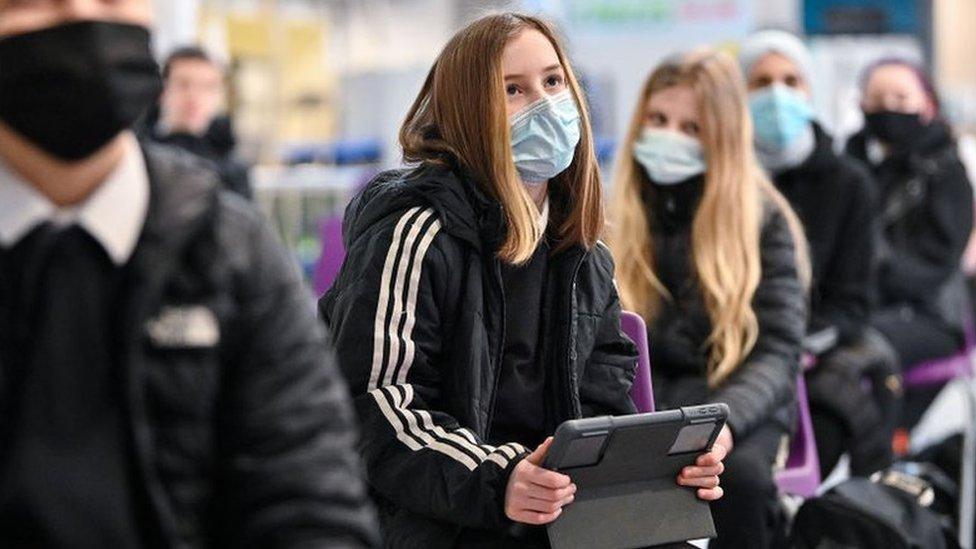Covid: How close is Scotland to full vaccination?
- Published
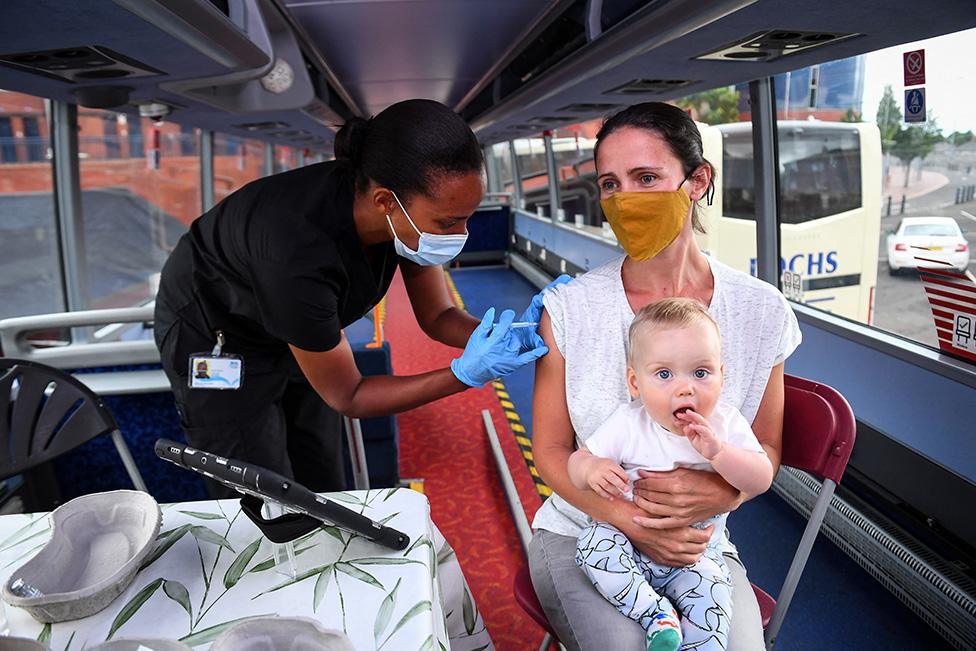
All adults in Scotland should now have been offered a Covid-19 vaccination, according to NHS Scotland.
As vaccinations for the over-12s begin and a vaccine certificate scheme is introduced, what has Scotland's vaccination programme achieved in its first 296 days?

More than eight million doses have been administered since December
The Covid-19 vaccination programme has been the biggest immunisation effort in the NHS's history.
It began in Scotland on 8 December last year, with the vaccinators themselves the first to receive the jabs.
Since then, 4,189,701 first doses have been given, according to Public Health Scotland (PHS) figures - that's 91% of people aged 16 or over.
A total of 3,837,689 people have also received second doses.
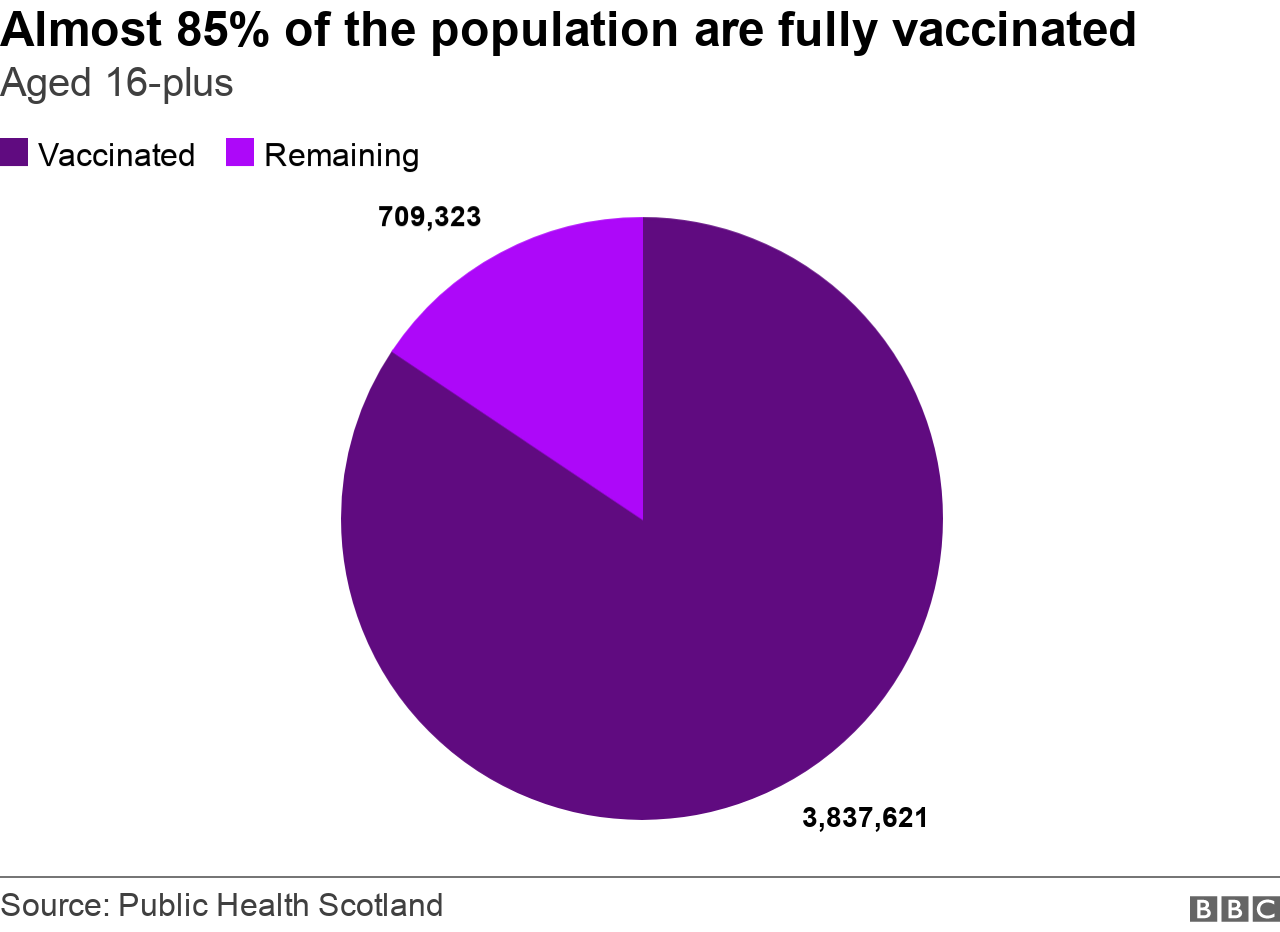
To achieve 100% coverage of everyone in Scotland aged 16 or over, there's just over 709,000 people left to do.
Almost half of that group have had their first dose, but the others are still waiting or have decided not to be vaccinated.
Looking at the over-40s only, more than 95% are now fully vaccinated with both doses - and some will have started to receive boosters as well.
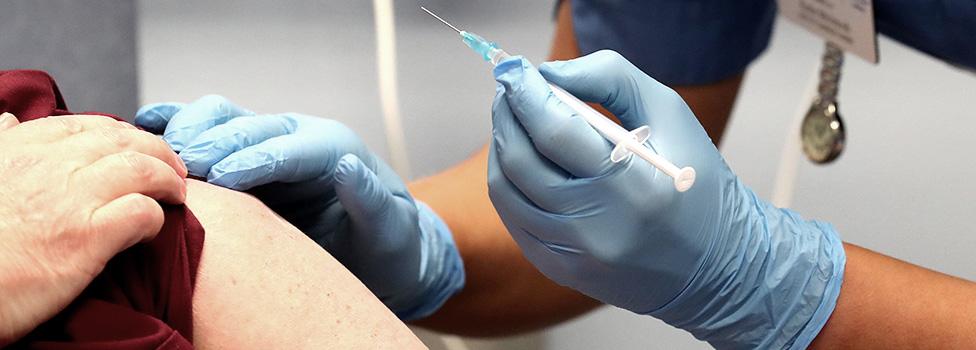
Prof Andrew Watterson, a public health researcher at the University of Stirling, says the Covid vaccination programme really stands apart when compared with similar efforts.
"The Covid vaccine rollout goes well beyond anything that has existed up to date for other infectious diseases in pace and scale," he says.
"The initial vaccine uptake in care homes was truly impressive. As of 28 September 2021, the double dose vaccine figure for staff in care homes is 100%, for front-line health workers it's 93%, for front-line social care workers it's 86%. That's excellent."
But Prof Watterson believes some high risk groups, such as police officers, teachers and food processing workers, were left "significantly exposed" at the start of the vaccination programme, unlike other European countries who prioritised these groups.
Scotland, like all the other UK nations, followed the guidance of the Joint Committee on Vaccination and Immunisation, external when prioritising who should get the vaccine first.
The residents of care homes for older adults were given top priority, followed by the over-80s and front-line health and social care workers.
Everyone over 50 was included in the priority list, as well as those with health conditions that made them particularly vulnerable.
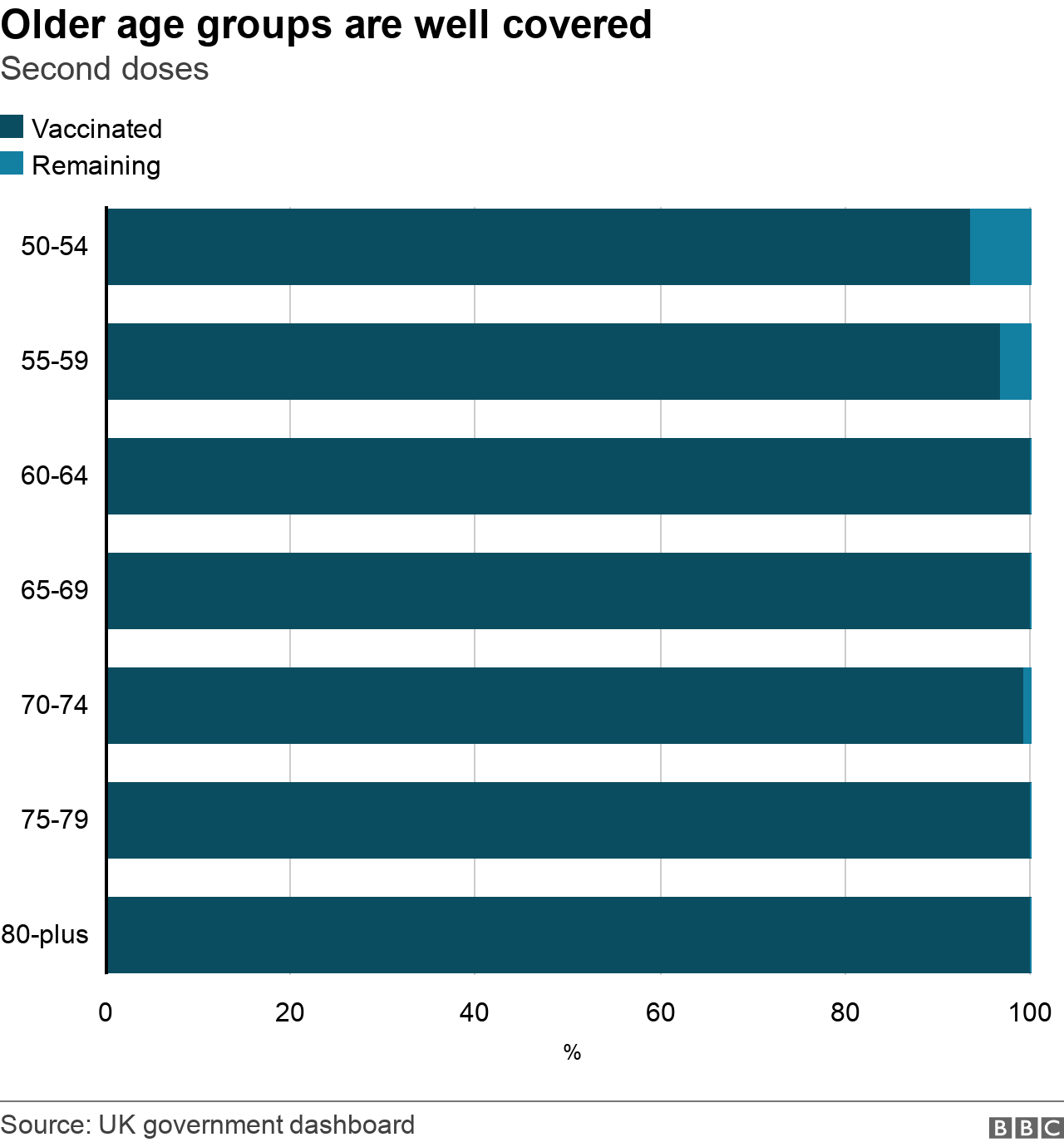
Virtually all the over-60s in Scotland are now fully vaccinated and the overwhelming majority of the over-50s are too.
The Scottish government said vaccination prioritisation had been "based on age and risk-related health factors, with key workers who fall into these categories among the first to be vaccinated".
What about younger age groups?
The vaccination of the under-50s began in May and none of the younger age groups are above 90% coverage yet for first doses.
But looking at a chart showing vaccinations over time with these groups, a trend becomes evident: the younger the age group, the lower population coverage plateaus.
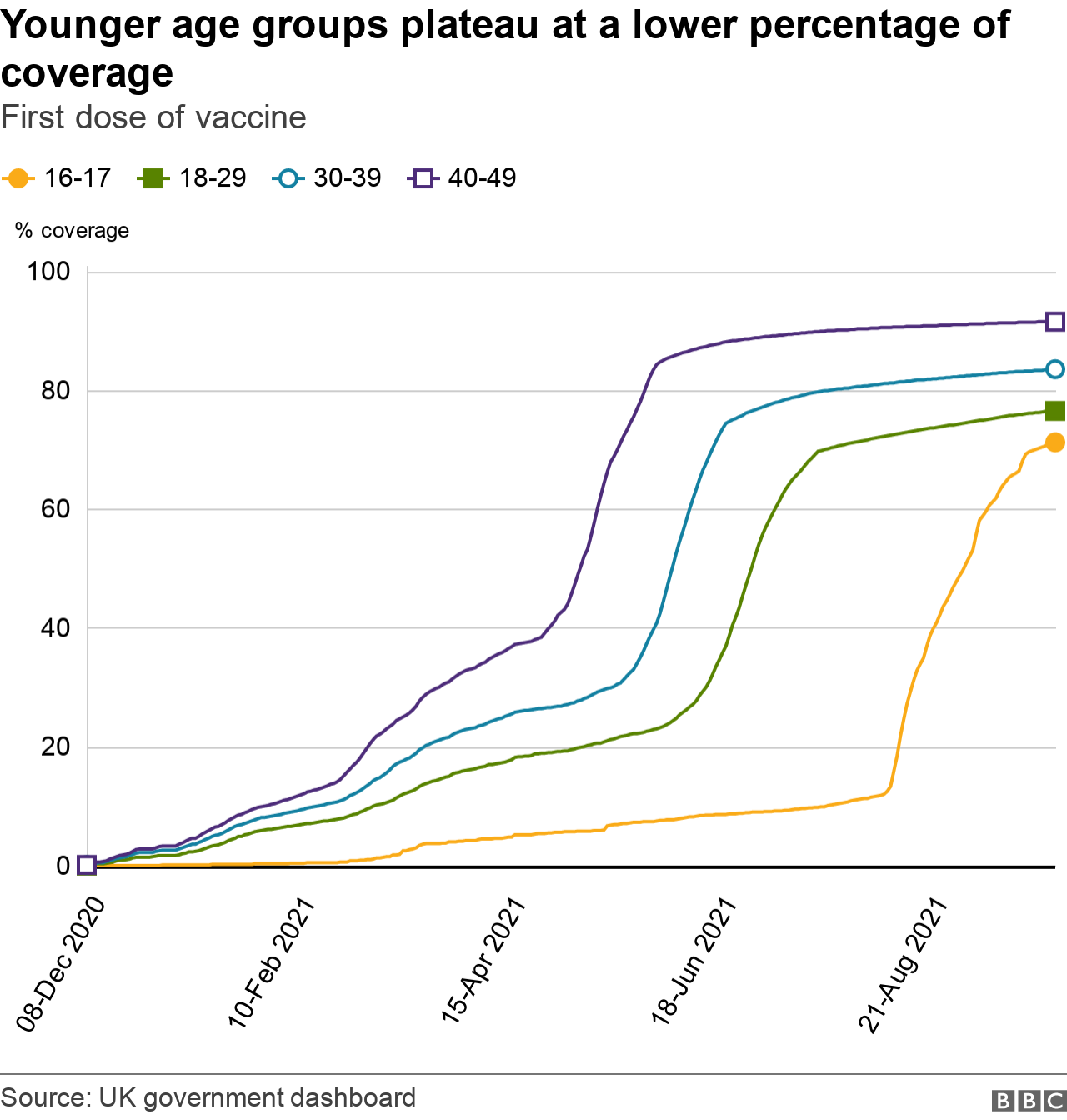
The exception to this trend could be the 16-17 age group.
The vaccination effort for most of these teenagers only began in August, but coverage is already over 70% for first doses.
Prof Watterson told BBC Scotland the Scottish government should maintain its focus on vaccinating young people, with 37% of 18-29 year olds and and 25% of 30-39 year olds still to be fully vaccinated.
"Some of these groups are most exposed and will both be at high risk themselves and present a high risk to others," he says.
"The double vaccination figures for a number of these groups has been going up very slowly indeed over several weeks."
Has there been a vaccine passport bounce?
One of the aims of Scotland's vaccine passport is to encourage younger people to get vaccinated.
Under the scheme, people over the age of 18 may be asked to prove they are fully vaccinated before they are allowed entry to certain venues and events.
The policy was announced at the beginning of last month and was formally approved by Holyrood on 9 September.
Speaking on BBC Radio Scotland on 16 September, Scotland's national clinical director, Jason Leitch, said it was "early days", but that he was hopeful there would be an "uptick" in young people being vaccinated because of the scheme.
Looking at the PHS figures which break down daily vaccinations by age group, there's a definite surge among 18-29 year olds at the beginning of September.
The decline in daily vaccinations throughout August is reversed and numbers start to rise again.
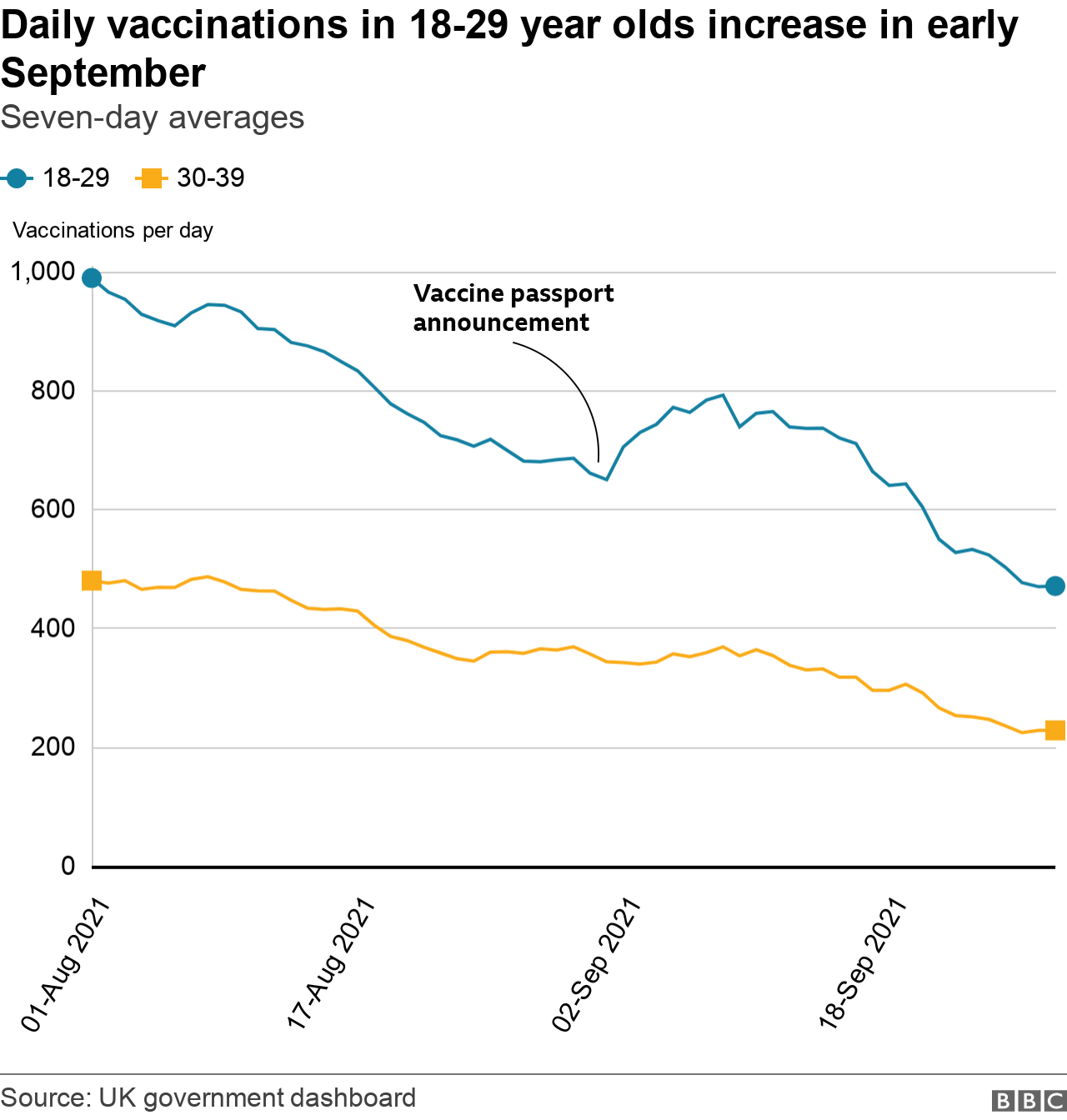
Other factors, such as vaccine supply, can affect daily vaccination numbers so it's not possible to say for certain that this rise is directly linked to the vaccine certificates announcement - but it doesn't seem to have harmed progress in this group.
How does the flu vaccination programme compare?
Flu is more seasonal than Covid, so vaccinations are targeted to autumn and winter.
And although publicity campaigns are run to encourage take-up, it's fair to say it hasn't received anywhere near the level of attention the Covid vaccination programme has, and some groups won't be targeted for vaccination.
Prof Watterson points to Public Health Scotland figures from this January, external, which show percentage coverage in older age groups and among health and social care staff to be much lower than Covid vaccination coverage.
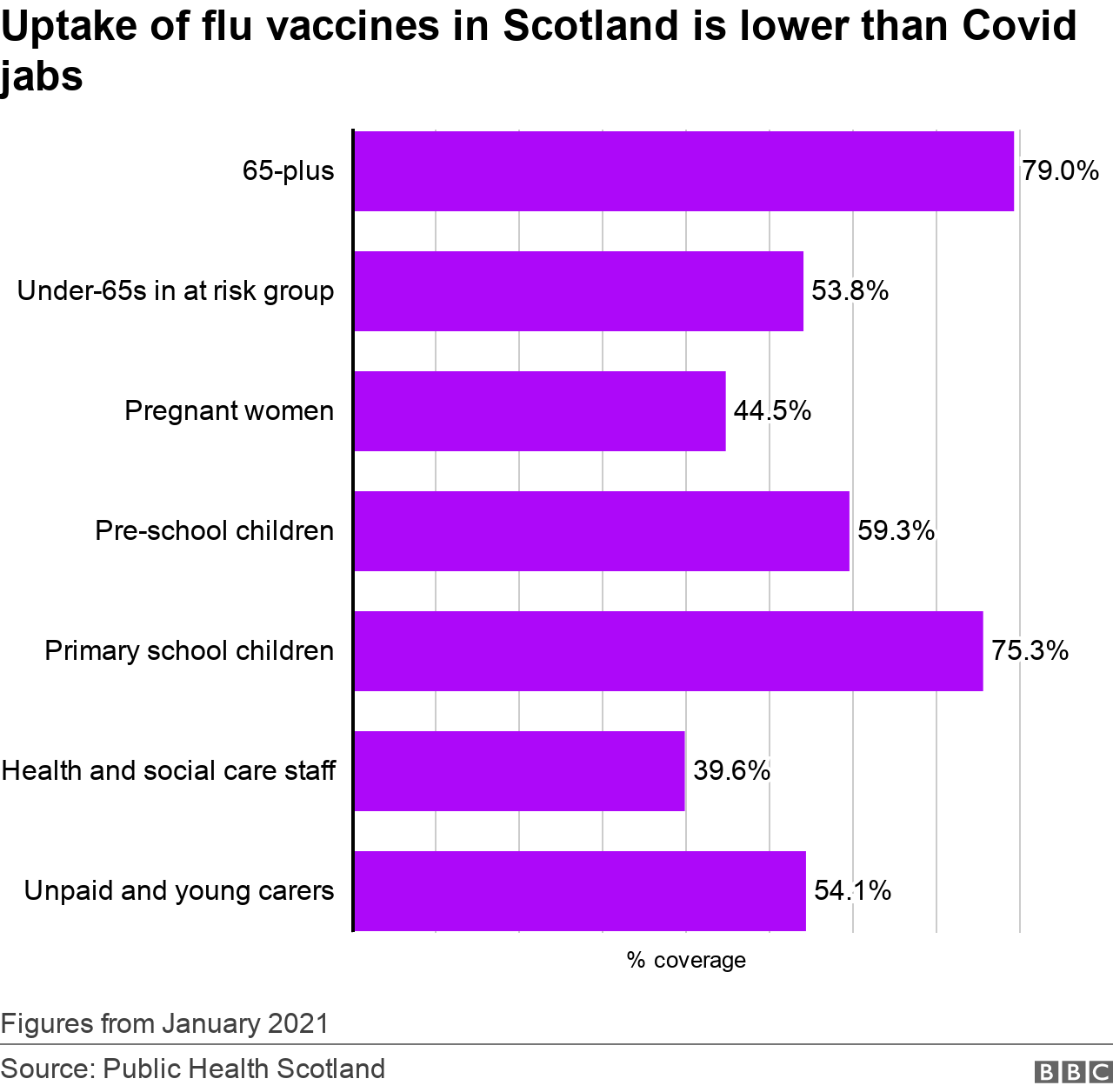
In England, total flu vaccine take-up between 2004-2005 and 2019-2020 ranged between 71% and 75%, according to Prof Watterson.
What's the picture where you live?
All local authorities have now achieved at least 75% dose two coverage of the over-16 population.
There's a big spread between Glasgow City at the bottom of the table (75.9%) and neighbouring East Dunbartonshire at the top (92.9%).
However, it's worth noting that local authorities with more young people will be further behind because of the way the vaccination programme was rolled out.
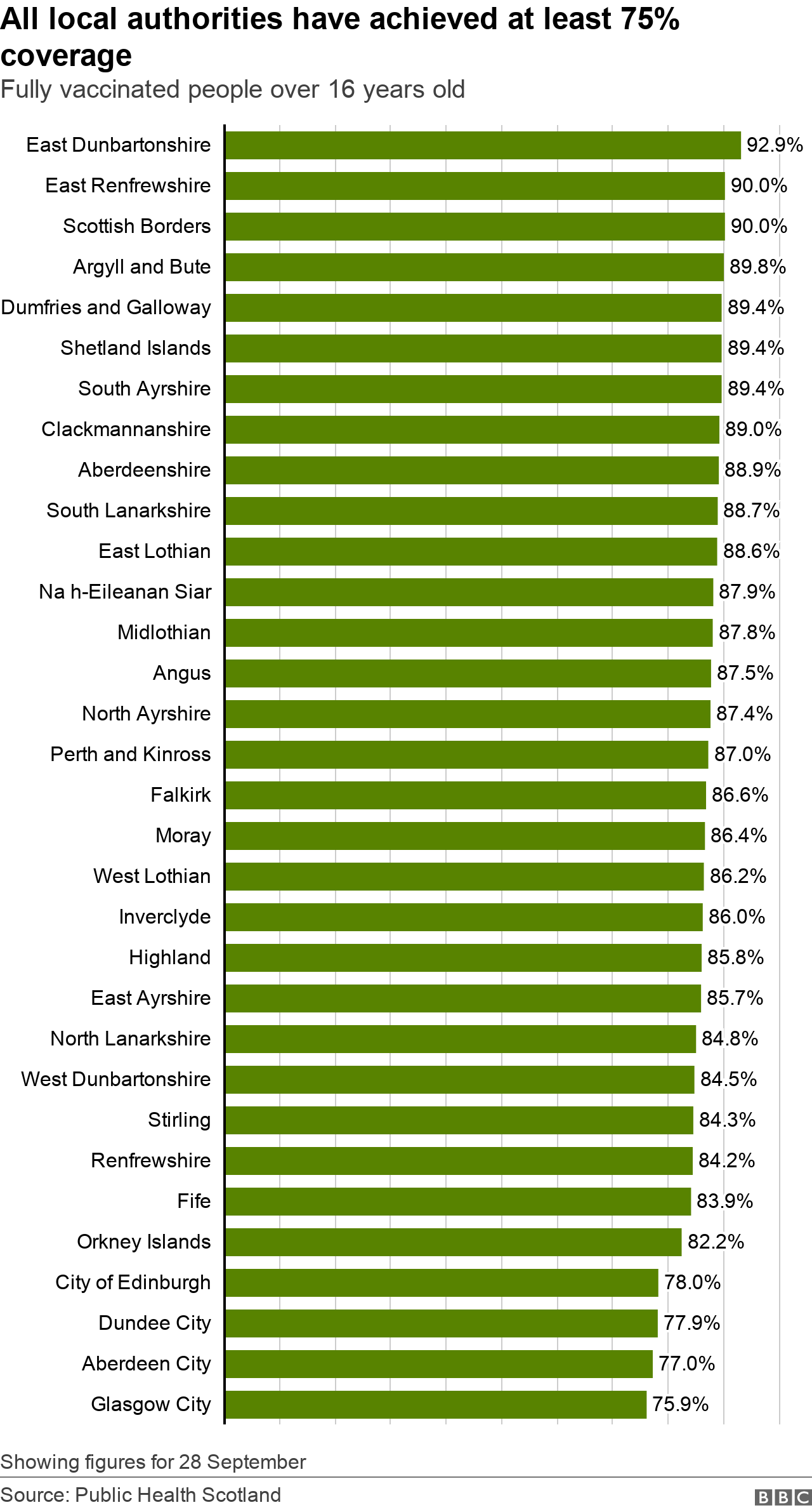
Which vaccines have been used in Scotland?
Currently the Pfizer-BioNTech, Oxford-AstraZeneca and Moderna vaccines are being given in Scotland, with each requiring two doses.
More than 50% of the jabs administered have been the AstraZeneca vaccine.
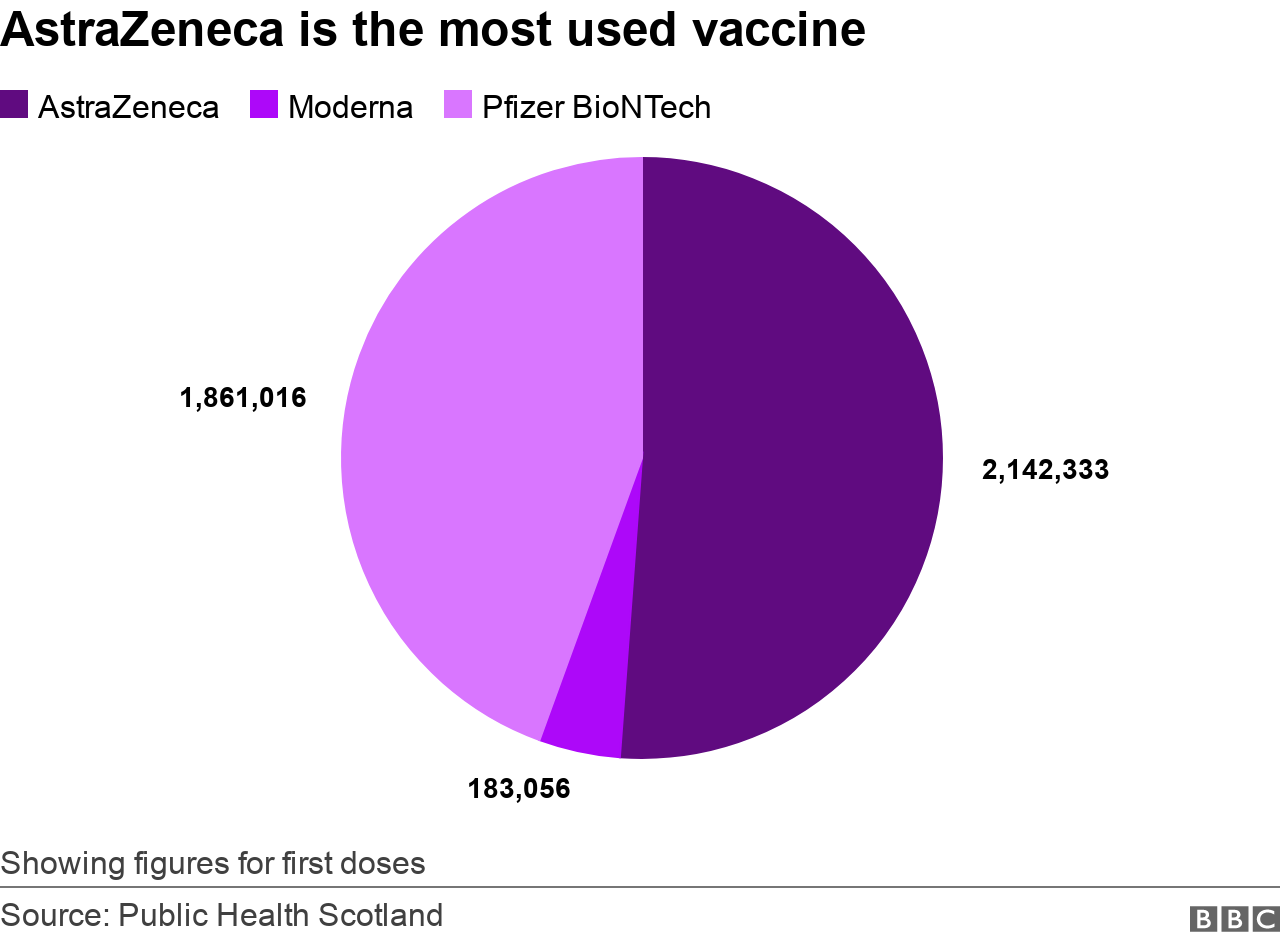
Looking at all the vaccine products, the highest number of jabs administered in one day was on 11 February, when 65,249 vaccinations were carried out.
There were four big vaccination pushes over the winter and spring, but with less people left to vaccinate the number of people being vaccinated per day is now decreasing.
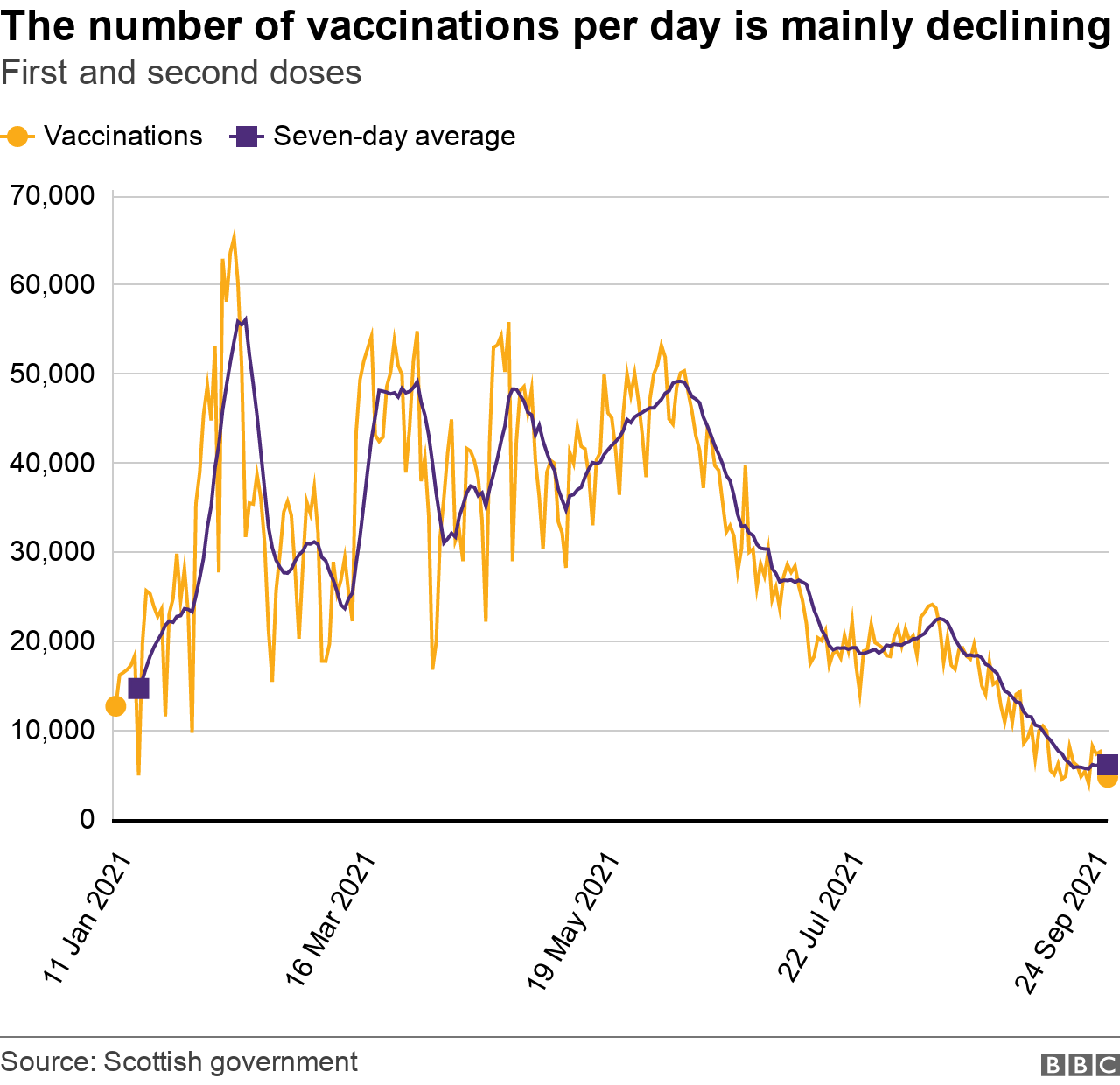
What's the evidence that vaccines are working?
The clearest way to see how vaccinations have been working is by counting the number of death certificates mentioning Covid-19.
Using National Records of Scotland figures, it's possible to see two big peaks in daily deaths - one in April 2020 and the second in January 2021.
The number of recorded cases over this summer and into the autumn has been much higher than January, but the number of deaths is far lower.
There are early indications that deaths may soon reach their peak for this "wave" of the pandemic. If that's the case, then deaths will have peaked at about a quarter of the level they did in April 2020.
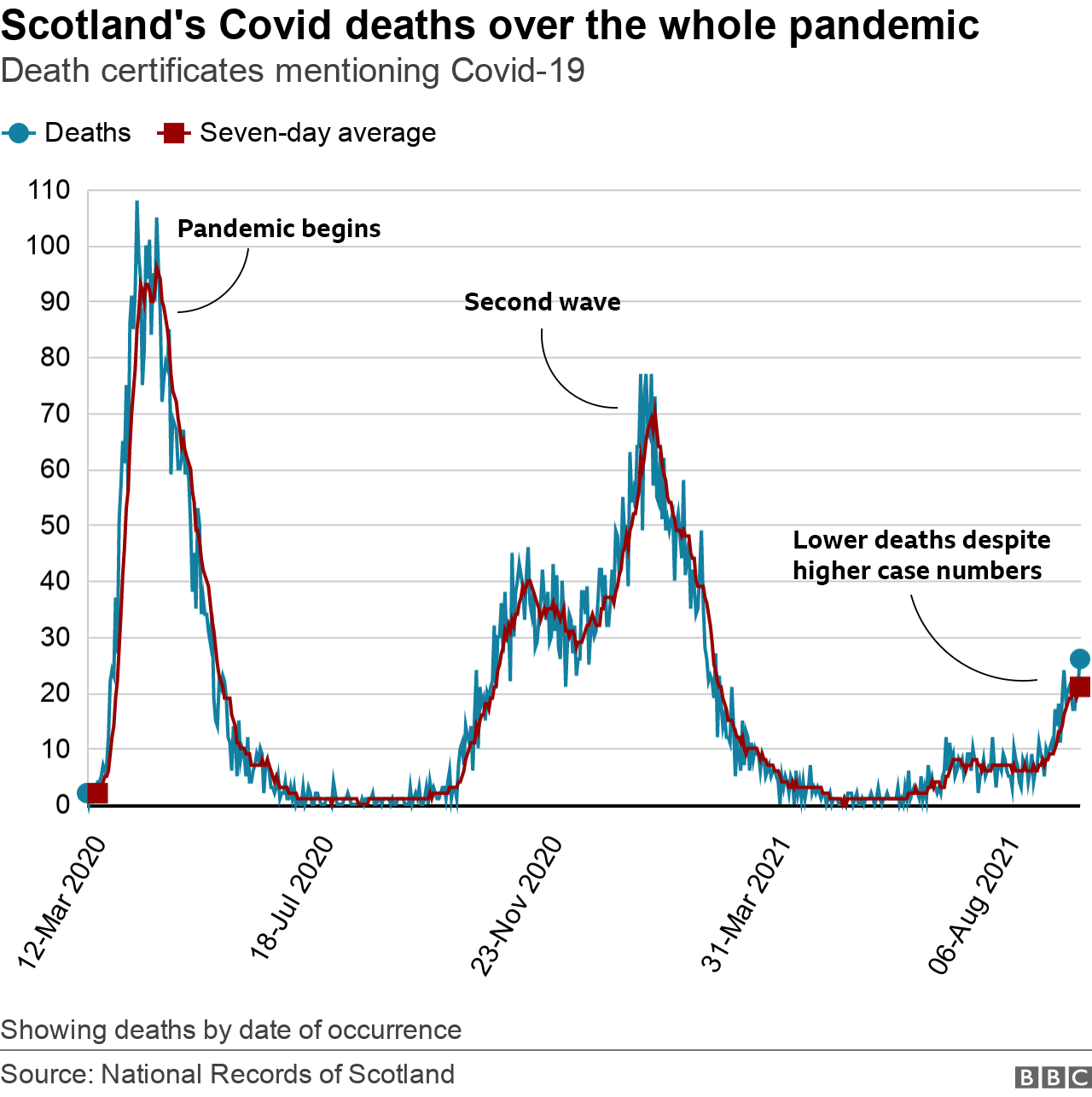
First Minister Nicola Sturgeon has said there is also evidence that hospital stays for Covid treatment are shortening because of the vaccination programme and recently released figures by Public Health Scotland, external appear to support that.
The average hospital stay was 13 days in January, but this had reduced by more than half by June.
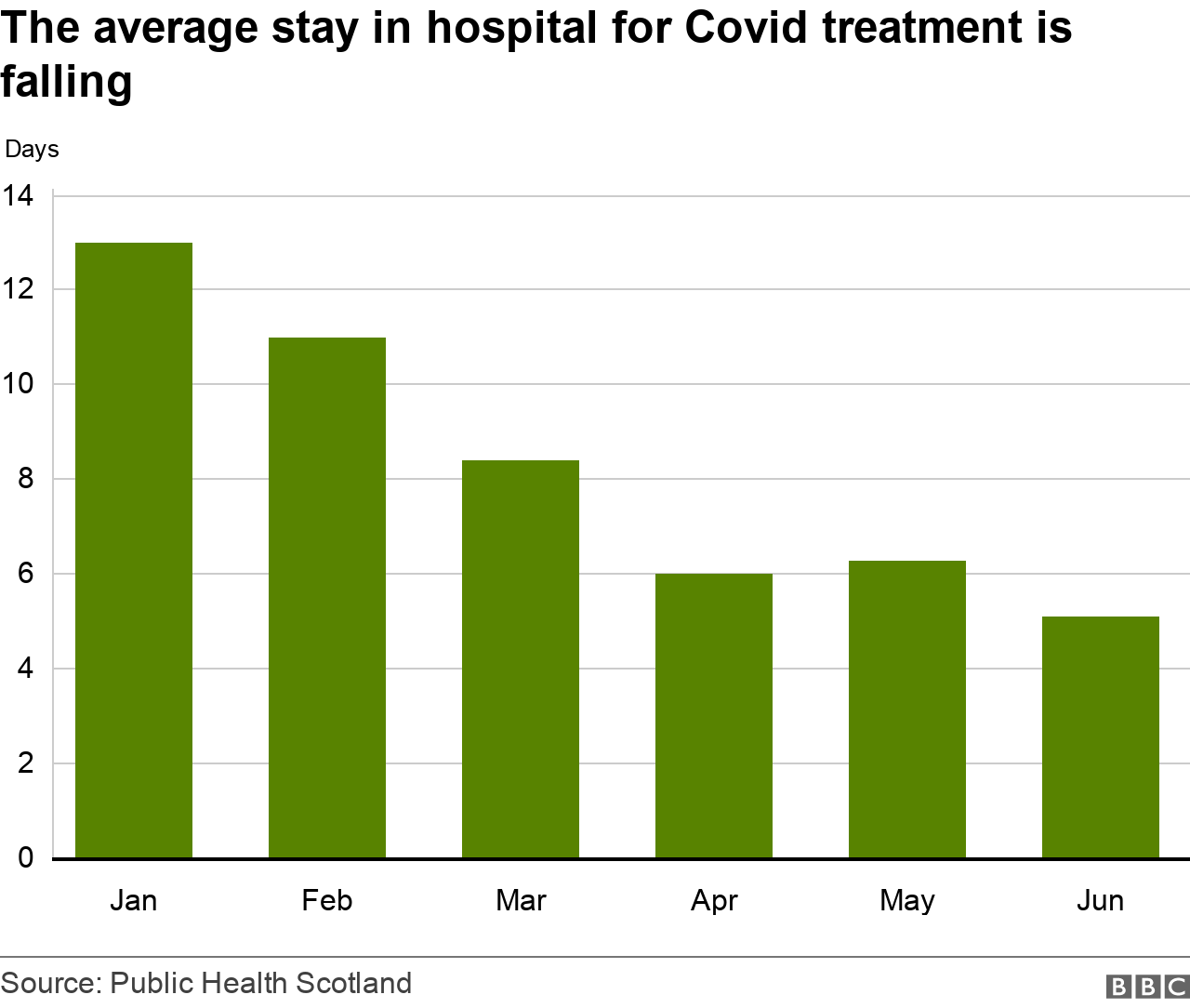
If vaccines are working and population coverage is good, is it time to relax?
Prof Watterson says Scotland needs to keep vaccinating to get on top of the pandemic.
"An incredible amount of work has gone in, but we cannot relax. We need to go further," he says.
He argues that the Scottish government should also adopt a "zero tolerance" approach to Covid, following the example of countries like New Zealand, rather than allowing case numbers to go unchecked.
"Both polio and smallpox were targeted for eradication but in Scotland, the government seems to have accepted that Covid not only cannot be eradicated, it can't be eliminated either," he says.
"It's worth reflecting that if we had accepted smallpox could not be eradicated globally, we'd be living with it still. Yet after a long roll-out and global action, it was gone in the 1970s."
The Scottish government adjusted its "strategic intent" towards Covid in June, external, saying it wanted "to suppress the virus to a level consistent with alleviating its harms while we recover and rebuild for a better future".
A spokesperson told the BBC: "Scotland's vaccination programme has been one of the fastest in the world, and we continue to urge anyone who has not yet come forward to do so as there is no doubt that vaccination represents our best way out of the pandemic and the best way to protect ourselves, our family and friends and our communities."
- Published18 January 2022
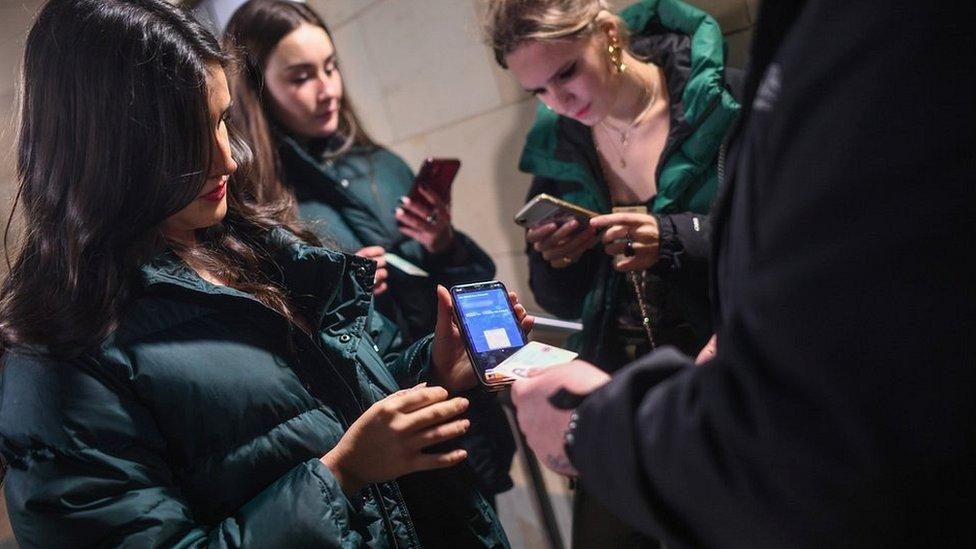
- Published27 August 2021
